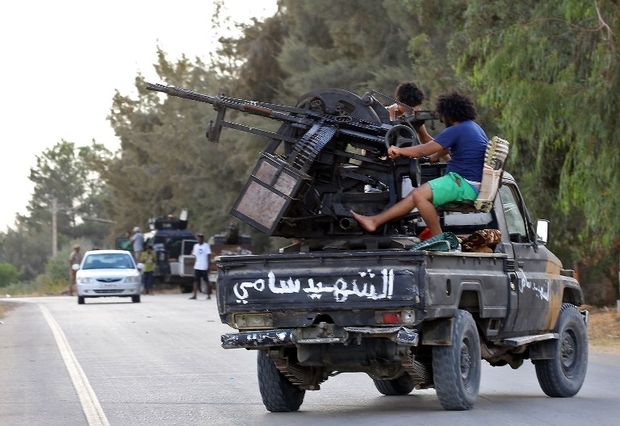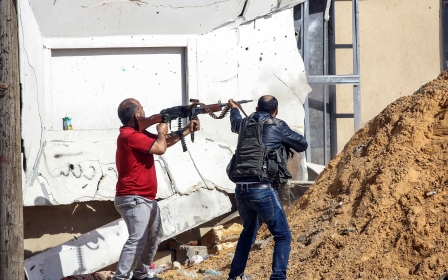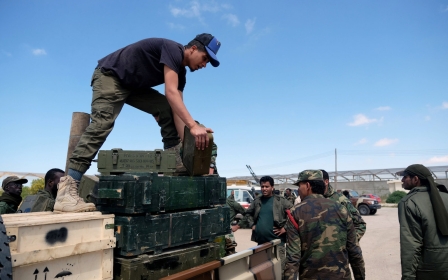Pro-Haftar offensive on Tripoli stalls as Libya's government troops take prisoners

An offensive by eastern forces on the Libyan capital Tripoli stalled in the face of strong resistance on the southern outskirts as the internationally recognised government said it had taken almost 200 prisoners.
The fighting between Khalifa Haftar's Libyan National Army (LNA) and troops under the internationally backed Tripoli government has killed at least 56 people and forced 8,000 to flee their homes in the city in the last week, the United Nations said.
A Reuters reporter heard occasional heavy gunfire and explosions as the LNA faced off with forces of Prime Minister Fayez al-Serraj's government around a disused former international airport and the Ain Zara district.
After sweeping up from the south, the LNA bogged down in Tripoli's southern suburbs, 11 km from the city centre. Several locations have changed hands more than once.
The UN chief warned that Libya is on the brink of "a very dangerous situation" as battles raged near the city.
UN chief Antonio Guterres on Wednesday appealed for a halt to hostilities to prevent the situation from spiralling out of control.
"It's still time to stop," he told reporters after briefing the UN Security Council in a closed session in New York.
"It's still time for a ceasefire to take place, for a cessation of hostilities to take place, and to avoid the worst, which would be a dramatic, bloody battle for Tripoli."
More than 190 LNA forces were captured, officials allied to Tripoli said, accusing the militia of using teenagers as fighters.
A total of 116 fighters were captured in Zawiya, a town west of Tripoli, and an additional 75 in Ain Zara on the southern outskirts of the capital, officials said.
In a prison in Zawiya, Reuters reporters saw prisoners, mostly young men, some wearing civilian clothes, sitting on the floor while others stood with their faces turned to a wall.
In Tripoli, officials brought families displaced by fighting on the southern fringes to shelter in schools. Red Crescent workers were handing out rations in one school as gunfire clattered in the distance.
Haftar's push on Tripoli in Libya's northwest is the latest turn in a cycle of factional violence and chaos in Libya dating back to the 2011 uprising that overthrew long-time ruler Muammar Gaddafi.
The European Union urged the LNA forces to stop their offensive, agreeing finally on a statement after France and Italy had sparred over how to handle the escalating conflict.
"The military attack launched by the LNA on Tripoli and the subsequent escalation in and around the capital are endangering civilians, including migrants and refugees, and disrupting the UN-led political process, with the risk of serious consequences for Libya and the wider region, including the terrorist threat," the EU top diplomat, Federica Mogherini, said in a statement.
France, which has oil assets in eastern Libya, has provided military assistance in past years to Haftar in his eastern stronghold, Libyan and French officials say. It was also a leading player in the war to unseat Gaddafi.
Italy supports the UN-backed government of Serraj.
Haftar has moved troops from southern and eastern Libya to Tripoli, stretching his lines.
Exploiting this, the Islamic State (IS) group's AMAQ news agency said that its militants had killed six soldiers from the LNA force near Sabha in Libya's southwest.
LNA spokesman Ahmed Mismari confirmed the attack but said there had been no casualties on the LNA side.
In its latest tally of casualties, the UN World Health Organisation (WHO) said 56 people - mainly combatants but also some civilians - including two doctors and an ambulance driver - had been killed, and another 266 wounded in Tripoli.
It was not clear if this included the toll given by the LNA for its soldiers - 28 killed and 92 wounded since the start of the offensive a week ago.
The number of people forced out of their homes by fighting rose to 8,075, the UN migration agency IOM said.
As well as the toll on civilians, the renewed conflict threatens to disrupt oil supplies, increase migration across the Mediterranean to Europe, scupper the UN peace plan for the country and encourage militants to exploit the chaos. Libya is a main transit point for migrants who have poured into Europe in recent years, mostly aided by trafficking gangs.
The LNA forces swept out of their stronghold in eastern Libya to take the sparsely populated but oil-rich south earlier this year, before heading towards Tripoli, where Serraj's UN-backed government sits.
Haftar was among the officers who helped Gaddafi seize power in a 1969 coup before parting ways with him later. But critics call Haftar another strongman in Gaddafi's mould.
Haftar has resisted UN pressure to accept a power-sharing settlement to stabilise the country, using his leverage as a Western ally against militant Islam in North Africa.
Middle East Eye propose une couverture et une analyse indépendantes et incomparables du Moyen-Orient, de l’Afrique du Nord et d’autres régions du monde. Pour en savoir plus sur la reprise de ce contenu et les frais qui s’appliquent, veuillez remplir ce formulaire [en anglais]. Pour en savoir plus sur MEE, cliquez ici [en anglais].





